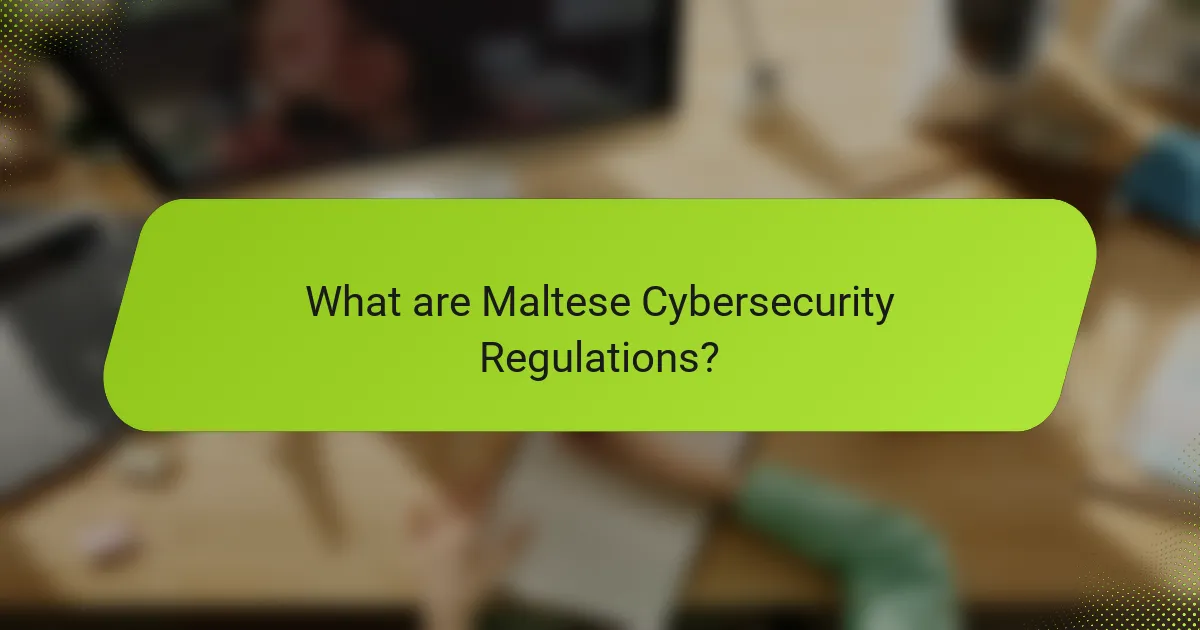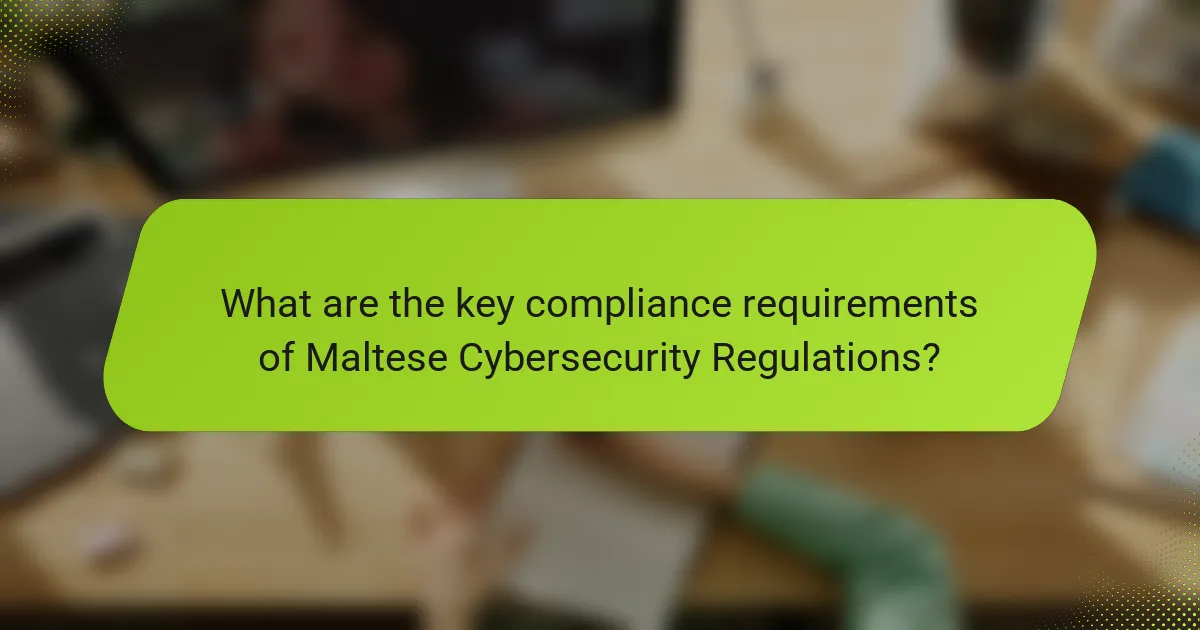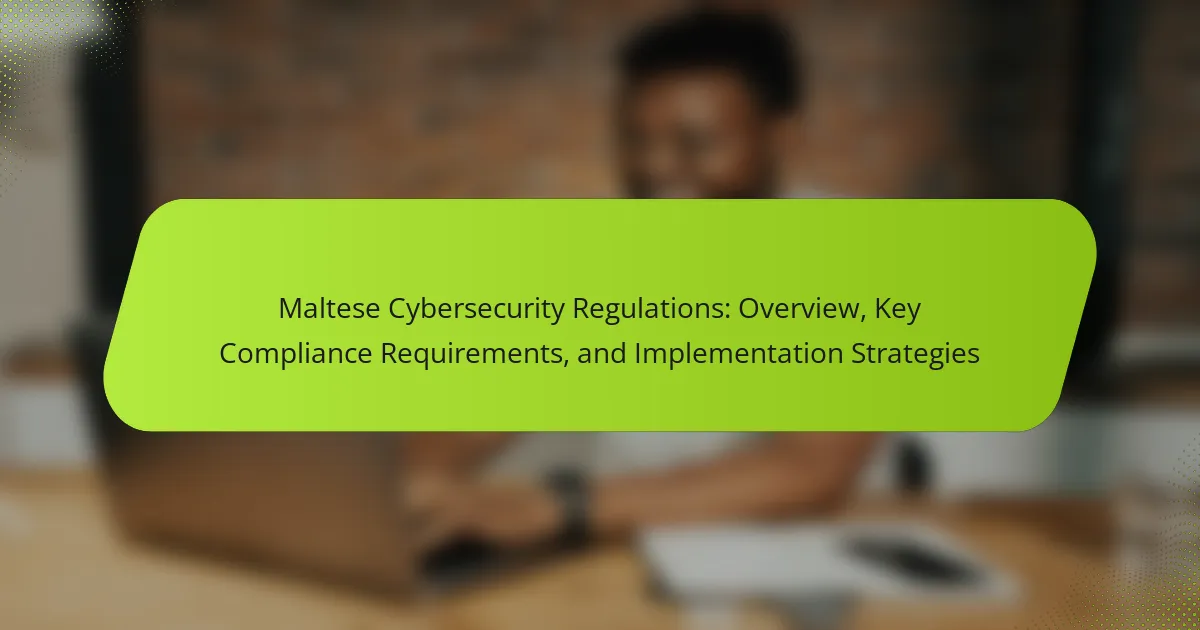
What are Maltese Cybersecurity Regulations?
Maltese cybersecurity regulations are legal frameworks designed to protect information systems and data within Malta. These regulations include the General Data Protection Regulation (GDPR) and the Network and Information Systems (NIS) Directive. GDPR governs data protection and privacy for individuals in the EU. The NIS Directive focuses on ensuring the security of network and information systems across the EU. Malta’s regulatory authority for cybersecurity is the Malta Communications Authority (MCA). The MCA enforces compliance with these regulations through audits and penalties. Organizations must implement appropriate technical and organizational measures to safeguard data. Non-compliance can result in significant fines and legal repercussions.
How do Maltese Cybersecurity Regulations impact businesses?
Maltese Cybersecurity Regulations significantly impact businesses by establishing compliance requirements that enhance data protection. These regulations mandate businesses to implement robust cybersecurity measures to safeguard sensitive information. Failure to comply can lead to severe penalties, including fines and reputational damage. Additionally, these regulations require regular audits and assessments to ensure ongoing compliance. Businesses must also appoint a Data Protection Officer to oversee compliance efforts. This framework fosters a culture of security and trust among consumers. Consequently, adherence to these regulations can provide a competitive advantage in the market.
What specific entities are affected by these regulations?
The specific entities affected by Maltese Cybersecurity Regulations include businesses operating in Malta, government agencies, and service providers handling sensitive data. These regulations apply to any organization that processes personal data or provides critical services. Financial institutions, healthcare providers, and telecommunications companies are also impacted due to their data handling practices. Additionally, any foreign entities operating within Malta’s jurisdiction must comply. Compliance ensures the protection of data and enhances cybersecurity measures across sectors.
How do these regulations align with EU directives?
Maltese cybersecurity regulations align with EU directives by incorporating the principles set out in the EU Cybersecurity Act. These regulations emphasize the need for a risk-based approach to cybersecurity. They also mandate compliance with the NIS Directive, which enhances security across essential services. Furthermore, Maltese regulations require adherence to the GDPR, protecting personal data within cybersecurity frameworks. This alignment ensures a unified standard for cybersecurity practices across EU member states. The Maltese framework reflects the EU’s commitment to improving overall cybersecurity resilience and cooperation among nations.
Why are Maltese Cybersecurity Regulations important?
Maltese Cybersecurity Regulations are important for protecting sensitive data and ensuring the integrity of digital infrastructure. They establish a legal framework that mandates organizations to implement security measures. These regulations help mitigate risks associated with cyber threats. They also promote trust among consumers and businesses by ensuring data protection. Compliance with these regulations can prevent financial losses from cyber incidents. Additionally, they align Malta with European Union standards, fostering international cooperation. The regulations enhance the country’s reputation as a secure digital environment, attracting investment and innovation.
What risks do these regulations mitigate?
Maltese cybersecurity regulations mitigate several risks associated with data breaches and cyber threats. These regulations aim to protect sensitive information from unauthorized access. By enforcing strict compliance measures, they reduce the likelihood of financial losses due to cyberattacks. Regulations also help ensure the integrity of critical infrastructure against potential disruptions. Furthermore, they promote accountability among organizations handling personal data. This accountability minimizes the risk of reputational damage in the event of a security incident. Overall, these regulations serve to enhance the overall security posture of businesses operating in Malta.
How do they enhance consumer trust?
Maltese cybersecurity regulations enhance consumer trust by establishing clear standards for data protection and privacy. These regulations ensure that organizations implement robust security measures to safeguard consumer information. Compliance with these regulations demonstrates a commitment to protecting customer data. This commitment fosters confidence among consumers, knowing their personal information is secure. Additionally, regular audits and assessments mandated by the regulations verify adherence to security protocols. Transparency in reporting security breaches further builds trust, as consumers are informed about potential risks. Overall, adherence to Maltese cybersecurity regulations signals to consumers that their data is treated with the utmost care and respect.

What are the key compliance requirements of Maltese Cybersecurity Regulations?
The key compliance requirements of Maltese Cybersecurity Regulations include risk assessment, incident reporting, and data protection measures. Organizations must conduct regular risk assessments to identify vulnerabilities. They are required to report cybersecurity incidents to the relevant authorities within 72 hours. Additionally, entities must implement adequate data protection measures to safeguard personal information. Compliance with the General Data Protection Regulation (GDPR) is also mandatory. Organizations should maintain a cybersecurity policy and ensure employee training. Regular audits are necessary to verify adherence to the regulations. These requirements are established to enhance national cybersecurity resilience and protect sensitive data.
What are the main components of compliance?
The main components of compliance include policies, procedures, and training. Policies establish the framework for compliance requirements. Procedures outline the specific steps to achieve compliance. Training ensures that employees understand and adhere to compliance standards. These components work together to create a robust compliance program. Effective policies and procedures are essential for meeting regulatory obligations. Regular training helps maintain awareness and accountability among staff. Compliance also involves monitoring and auditing to ensure adherence to established standards.
What documentation is required for compliance?
Compliance documentation for Maltese Cybersecurity Regulations includes several key elements. Organizations must maintain a cybersecurity policy that outlines their security framework. They are also required to document risk assessments that identify potential threats and vulnerabilities. Incident response plans must be prepared and regularly updated to address security breaches. Additionally, organizations need to keep records of employee training on cybersecurity practices. Compliance audits should be documented to ensure adherence to regulations. Finally, organizations must maintain logs of security incidents and responses to demonstrate accountability.
How is data protection integrated into compliance?
Data protection is integrated into compliance through legal frameworks and regulatory requirements. These frameworks mandate organizations to implement measures that safeguard personal data. In Malta, the Data Protection Act aligns with the General Data Protection Regulation (GDPR). Compliance requires organizations to conduct data protection impact assessments. This ensures risks are identified and mitigated. Additionally, organizations must appoint Data Protection Officers to oversee compliance efforts. Regular audits and training programs further enhance adherence to data protection regulations. This integration helps prevent data breaches and ensures accountability.
What penalties exist for non-compliance?
Penalties for non-compliance with Maltese Cybersecurity Regulations can include fines and legal action. Organizations may face administrative fines that can reach up to €1 million. Serious violations may lead to criminal charges against responsible individuals. Regulatory authorities can impose additional sanctions, such as suspension or revocation of licenses. Non-compliance may also result in reputational damage, affecting business operations. These penalties are enforced to ensure adherence to cybersecurity standards. Compliance is essential for protecting sensitive data and maintaining public trust.
What are the consequences for businesses that fail to comply?
Businesses that fail to comply with Maltese Cybersecurity Regulations face significant penalties. These penalties can include hefty fines that may reach up to €5 million. Non-compliance can also lead to legal action from regulatory bodies. In addition, businesses may suffer reputational damage, resulting in loss of customer trust. This can ultimately lead to decreased revenue and market share. Compliance is essential for maintaining operational integrity and protecting sensitive data. Failure to adhere to these regulations can also result in increased scrutiny from authorities in the future.
How do these penalties compare to other jurisdictions?
Maltese cybersecurity penalties are generally aligned with those in the European Union. The EU’s General Data Protection Regulation (GDPR) imposes fines up to 4% of annual global turnover. Malta, as an EU member, follows similar frameworks, with penalties reaching up to €1 million or 2% of annual turnover for certain breaches. Other jurisdictions, such as the United States, have varying penalties based on state laws and federal regulations. For instance, fines under the California Consumer Privacy Act can reach $7,500 per violation. Comparatively, Malta’s penalties are moderate within the EU context but stricter than some U.S. state regulations. This positioning reflects Malta’s commitment to cybersecurity and data protection.

What are effective implementation strategies for Maltese Cybersecurity Regulations?
Effective implementation strategies for Maltese Cybersecurity Regulations include establishing a comprehensive risk management framework. This framework should identify and assess cybersecurity risks specific to the organization. Regular training and awareness programs for employees are essential to ensure compliance. Organizations must also implement robust technical controls, such as firewalls and encryption, to protect sensitive data.
Regular audits and assessments help verify adherence to regulations and identify areas for improvement. Collaboration with local authorities and cybersecurity experts can enhance compliance efforts. Additionally, maintaining clear documentation of policies and procedures is crucial for demonstrating compliance during audits. These strategies collectively support the effective implementation of Maltese Cybersecurity Regulations.
How can businesses prepare for compliance?
Businesses can prepare for compliance by conducting a thorough risk assessment. This assessment identifies potential vulnerabilities in their systems. Next, businesses should implement necessary security measures to mitigate these risks. Training employees on compliance requirements is also crucial. Regular audits help ensure ongoing adherence to regulations. Additionally, maintaining documentation of compliance efforts is essential for accountability. Engaging with legal experts can provide guidance on specific regulations. Finally, staying informed about updates in cybersecurity laws is vital for continued compliance.
What steps should be taken to assess current cybersecurity posture?
Identify existing cybersecurity policies and procedures. Review documentation for gaps and compliance with regulations. Conduct a risk assessment to identify vulnerabilities and threats. Evaluate current security technologies and controls in place. Perform [censured] testing to simulate potential attacks. Analyze incident response plans for effectiveness and readiness. Engage staff in cybersecurity awareness training to enhance security culture. Document findings and create an action plan for improvements.
How can employee training enhance compliance efforts?
Employee training enhances compliance efforts by ensuring that employees understand regulations and policies. Well-structured training programs provide clear guidelines on compliance requirements. They also help employees recognize potential risks and the importance of adhering to regulations. Regular training updates keep employees informed about changes in laws and practices. Statistics show that organizations with ongoing training programs see a 50% reduction in compliance violations. This is critical in industries where regulatory penalties can be severe. Training fosters a culture of compliance, leading to better overall organizational performance.
What resources are available for businesses to aid compliance?
Businesses can access various resources to aid compliance with Maltese cybersecurity regulations. These include government guidelines published by the Maltese government. The Malta Cyber Security Agency provides essential frameworks and best practices. Industry-specific compliance checklists are available from relevant trade associations. Online training programs offer education on compliance requirements. Consultation services from cybersecurity firms can assist in implementing regulations. Additionally, legal resources provide insights into regulatory obligations. Regular updates from the European Union on cybersecurity directives are also beneficial. These resources collectively support businesses in achieving compliance effectively.
Which organizations provide guidance on Maltese Cybersecurity Regulations?
The primary organizations providing guidance on Maltese Cybersecurity Regulations are the Malta Communications Authority (MCA) and the National Cyber Security Agency (NCSA). The MCA oversees regulatory compliance in the telecommunications and broadcasting sectors, which includes cybersecurity aspects. The NCSA is responsible for national cybersecurity strategy and implementation. Both organizations publish guidelines and frameworks to assist businesses in adhering to cybersecurity regulations. Their resources include best practices, compliance checklists, and training programs. These entities ensure that organizations in Malta align with EU cybersecurity directives and local laws.
What tools can assist in compliance monitoring?
Compliance monitoring can be assisted by various tools designed to ensure adherence to regulations. Key tools include compliance management software, which tracks regulatory changes and assesses compliance status. Risk assessment tools help identify potential vulnerabilities and gaps in compliance. Automated reporting tools streamline documentation and reporting processes, ensuring timely submissions. Additionally, audit management software facilitates internal audits and compliance checks. These tools provide organizations with the necessary resources to maintain compliance with Maltese cybersecurity regulations effectively.
What best practices should businesses follow for ongoing compliance?
Businesses should implement regular compliance audits to ensure adherence to Maltese cybersecurity regulations. These audits help identify gaps in security and compliance. Training employees on cybersecurity best practices is crucial. This training raises awareness of potential threats and compliance requirements. Establishing a clear incident response plan is essential. It enables businesses to respond effectively to security breaches. Documenting all compliance efforts is necessary for accountability. This documentation serves as proof during audits or investigations. Regularly updating cybersecurity policies reflects changes in regulations. This practice ensures ongoing alignment with legal requirements. Engaging with legal experts can provide insights into complex regulatory landscapes. This engagement helps businesses stay informed about evolving compliance standards.
How can regular audits improve compliance status?
Regular audits enhance compliance status by identifying gaps in adherence to regulations. They provide an objective assessment of existing policies and procedures. Regular audits help organizations stay updated with changing regulations. They also promote accountability among employees regarding compliance practices. Furthermore, audits facilitate early detection of potential compliance issues. This proactive approach allows organizations to address problems before they escalate. According to a study by Deloitte, organizations that conduct regular audits experience 30% fewer compliance violations. Regular audits also foster a culture of continuous improvement within the organization.
What role does incident response planning play in compliance?
Incident response planning is crucial for compliance with cybersecurity regulations. It establishes a structured approach to manage and respond to security incidents. Effective incident response planning ensures organizations can quickly detect, respond to, and recover from incidents. This aligns with regulatory requirements that mandate timely reporting and mitigation of breaches. In Malta, compliance with the General Data Protection Regulation (GDPR) and the Network and Information Systems (NIS) Directive emphasizes the need for such plans. Organizations that implement robust incident response plans are better positioned to demonstrate compliance during audits. This proactive measure reduces the risk of penalties associated with non-compliance.
Maltese Cybersecurity Regulations are legal frameworks aimed at protecting information systems and data within Malta, including the General Data Protection Regulation (GDPR) and the Network and Information Systems (NIS) Directive. This article provides an overview of these regulations, detailing their impact on businesses, compliance requirements, and the importance of adherence for data protection and consumer trust. Key topics include the entities affected, alignment with EU directives, risks mitigated, penalties for non-compliance, and effective implementation strategies. Additionally, the article highlights best practices for ongoing compliance and resources available to assist organizations in meeting regulatory obligations.
